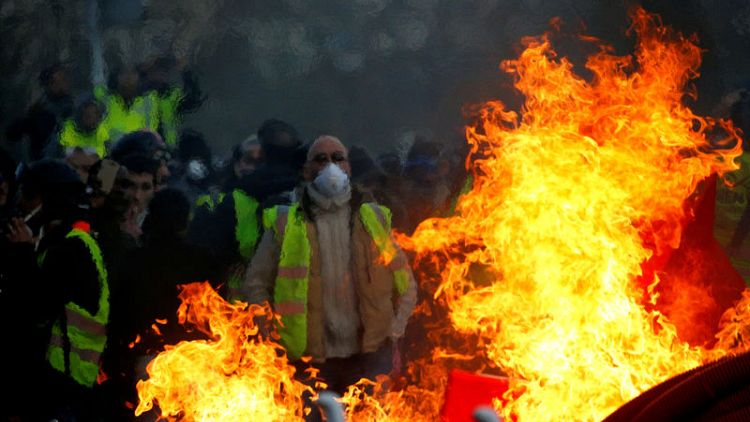By Richard Lough
PARIS (Reuters) - France's "yellow vests" suffered the first setback to their ambitions to contest May's European elections after one of 10 candidates and their campaign director quit following a barrage of attacks from within the divided protest movement.
The withdrawals come less than a week after a small group within the movement announced its list in a move which exposed deep splits about whether and how to become a more organised political force.
Campaign chief Hayk Shahinyan said elections could present an opportunity for the "yellow vests", whose anti-government protests have challenged President Emmanuel Macron's authority, provided the loose-knit movement prepared properly.
But he expressed doubts over whether this was the case.
"I have taken the decision to withdraw from my activities ... and take a week to analyse, reflect and prepare my next steps," Shahinyan wrote on Facebook.
One opinion poll last week showed the "yellow vests" could prove a disruptive force in the European elections, stealing votes from the far-right and so inadvertently help Macron, whose liberal economic reforms triggered their original protests.
But some activists have accused the candidates of betraying the movement.
One, Marc Dunoyer told the Journal du Dimanche paper that he was quitting the candidate list because of death threats over his support for Macron during the 2017 presidential race, even if he was now "disappointed" by the former investment banker.
The "yellow vests", named after high-visibility vests French drivers must keep in their cars, began their protests in November against fuel taxes and the high cost of living.
The movement quickly morphed into a broader rebellion against the political elite and inequality, leading to some of the worst violence seen on French streets in decades.
But it is split along open faultlines: between radicals who want to oust Macron and moderates who back dialogue, and between those who wish it to remain a grassroots, apolitical movement and those who see an opportunity to break into politics.
(Reporting by Richard Lough; Editing by Catherine Evans)
